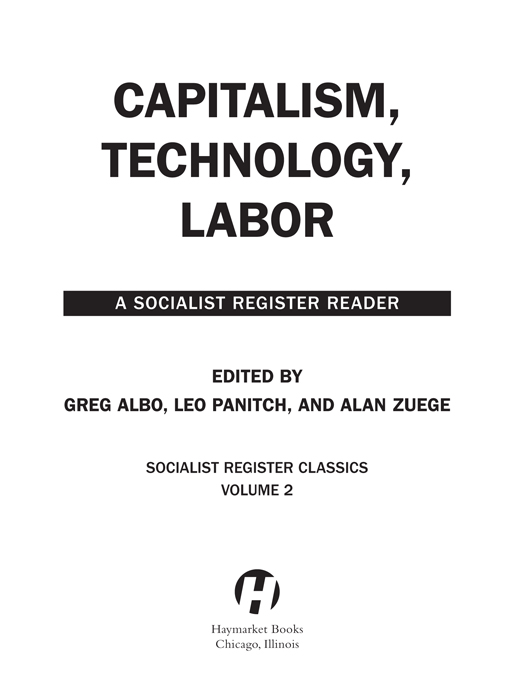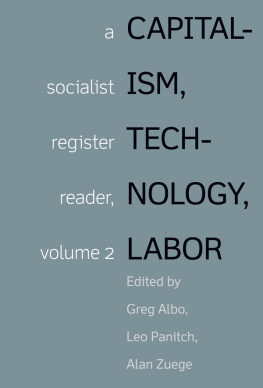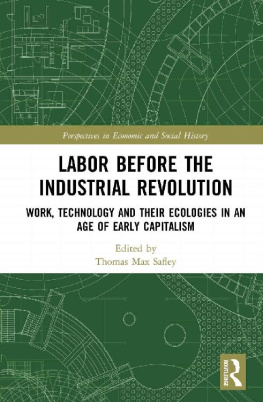CAPITALISM, TECHNOLOGY, LABOR

2020 Socialist Register
Published in 2020 by
Haymarket Books
P.O. Box 180165
Chicago, IL 60618
773-583-7884
www.haymarketbooks.org
ISBN: 978-1-64259-214-6
Trade distribution:
In the US, Consortium Book Sales and Distribution, www.cbsd.com
In Canada, Publishers Group Canada, www.pgcbooks.ca
In the UK, Turnaround Publisher Services, www.turnaround-uk.com
All other countries, Ingram Publisher Services International,
This book was published with the generous support of Lannan Foundation and Wallace Action Fund.
Cover design by Eric Kerl.
Library of Congress Cataloging-in-Publication data is available.

CAPITALISM, TECHNOLOGY, LABOR: AN INTRODUCTION
Greg Albo
At seemingly every turn, the political economy of contemporary capitalism is being transformed by unprecedented scientific, industrial, and commercial innovations. This new technological infrastructure is most visible in the penetration of the information-communication sector, through the internet, social media, and digital surveillance, into every nook and crack of work and daily life. But the imprint of the new automation is registered, too, in each moment of the circulation of capital: in the electronic bits and bytes form in which credit money is now created, circulated, and regulated; in the robotics and telematics that set the pace of the labor process and direct the distributional logistics of commodity production; and in the algorithms which gather infinite blocks of big data made up of individualized preferences, likes, journeys, and above all track the consumer purchases that facilitate the realization of new production.
As this new phase of value production consolidates and gains pace, its social meaningand implications for socialist strategywarrant considered attention. Indeed, there already exists a small library of contending forecasts from governments, corporations, and unions on the ways workplaces are being refashioned; on the new economic sectors that are emerging, from the web-centered sharing economy to the internet of things; on the occupations and jobs at risk of disappearing; on the new STEM and coding competencies that will be necessary to find future employment at all; and on the policy mandates for the redesign of state apparatuses to aid social adjustments to platform capitalism.
A very different remit, one that grounds the analysis of technological change in the capitalist dynamics of work and class, has always guided the Socialist Register. From its very first volumes, the Register warned against the technological fetishism that has accompanied each new cluster of product innovations and production techniques, and rejected the claims that these economic advances offered a technical fix for the class antagonisms and ecological dislocations of the outgoing, archaic era of capitalism. The essays in this collection, drawn from over five decades of the Registers annual publication, locate the technological transformations of capitalism concretely and directly within the competitive imperatives for capitalists to accumulate without limit. But they also reveal the class and political barriers to this drive: all the new machines in the world cannot ensure the social and economic conditions for profitable accumulation, nor can they contain workers struggles for improved wages and limits on the stresses of workplace intensification, or eradicate popular demands for cooperative production that extend to democratic control over technological change.
I.
The impact of new technologies on the working class and the labor movement has always been both controversial and central to the study of capitalism. The founding text of classical political economy, Adam Smiths Wealth of Nations (1776), opens with a detailed study of the division of labor in the modern pin factory, made possible by the invention of a great number of machines which facilitate and abridge labor, and enable one man to do the work of many. And David Ricardo famously reworked the third edition of his Principles of Political Economy and Taxation (1821) to account for the question of machinery as the First Industrial Revolution gained steam and the displacement of labor became a source of political upheaval. But it was Karl Marx who insisted, in his critique of political economy in Capital (1867), that these developments first had to be located in capitalism as a historically specific mode of commodity production for the purposes of accumulating additional value in the form of profits. In Marxs analysis of capitalisms particular social relations of production and property, technological change occupies an especially prominent place.
Both the exploiting and producing classes, Marx argued, are subject to the imperatives of market competition for their self-reproduction. For the working classes, skills and capacities to earn wages in the labor market become prerequisites for obtaining the means of subsistence. For the capitalist classes, market competition compels constant cost cutting to sustain competitive prices, particularly through continual innovation in new technologies in production, new products, and a constant reorganization of work. As early as The Communist Manifesto (1848), Marx and Friedrich Engels recognized in capitalism a constant revolutionizing of production, uninterrupted disturbance of all social conditions, everlasting uncertainty and agitation. The need of a constantly expanding market for its products chases the bourgeoisie over the whole surface of the globe. It must nestle everywhere, settle everywhere, establish connections everywhere. This vivideven futuristicphrasing still captures very well the general competitive imperatives that compel capitalism to endless accumulation, while inviting us to investigate anew the precise, concrete ways that the means of production are set in motion and a surplus extracted from workers, which vary greatly by firm, across time, and between places.
In the Marxist view of capitalist development, as recently laid out by David Harvey in his Marx, Capital, and the Madness of Economic Reason (2017), technological change is a systematic and cumulative process of revolutionizing the means of production while simultaneously extending private property controls over value chains that are steadily more interconnected and organizationally complex. Under the pressure of competition, capitalists search out new techniques, organizations, and markets that allow them to increase output and sell more cheaply, attaining extra profit and a larger market share from a competitive advantage in value extraction. Marx conceptualized this as a process of relative surplus value extraction (distinct from absolute surplus extraction, from working longer or more intensively) and identified this tendency as a distinguishing and necessary feature of the capitalist mode of production. Technological change thus raises the productivity of labor such that for a given unit of labor-time input of average quality, the volume of output increases, the total value produced remains constant, and individual commodity prices fall, but the share of value appropriated by capitalists increases (as the value of labor power declines with cheaper goods).
The fetishism that plagues conventional technology studiesnot least in discussions of full automation todayis the tendency to explain these results as a consequence of the machines (or electronic devices) in themselves; and from there to posit technical fixes to socioeconomic problems, with heated warnings of the horrors that will unfold absent the necessary social adjustments to the new technological and market conditions. Far too often, social assessment and political calculations degenerate into forecasts either of apocalypse by machine, or of imagined technological utopias now enabled. In contrast, the essays in this volume advance a class analysis of technological change that mediates between the structural imperatives of accumulation, on one hand, and the active agency of workers struggling to shape their conditions of work, on the other, to draw out the specific ways that restructuring impacts on capital and labor.
Next page












